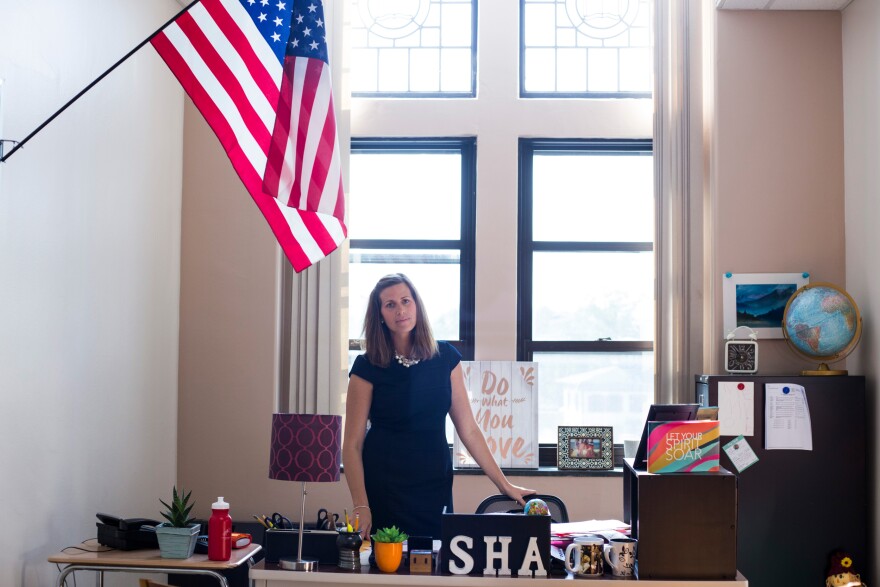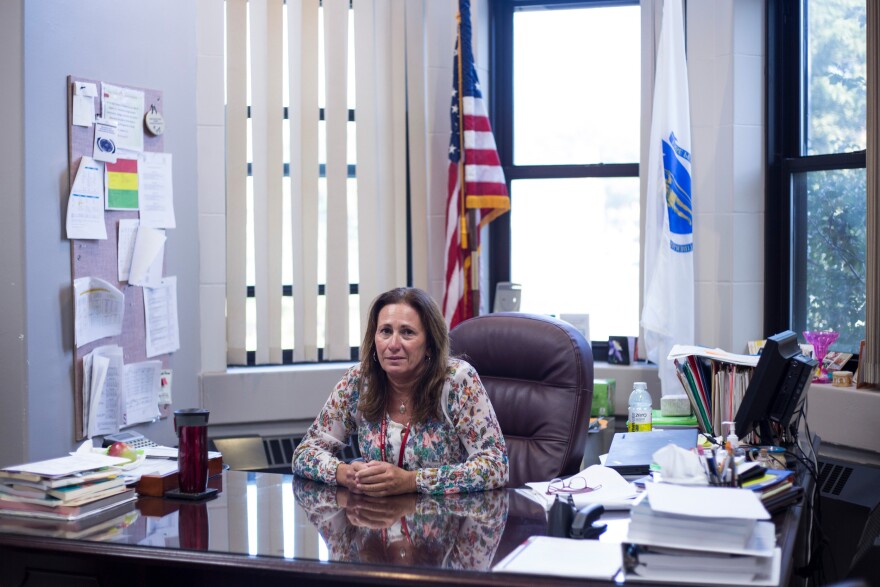On an early Monday morning, a stream of sleepy teenagers wearing maroon polos and tan slacks passed under a decorative gothic arch to enter the High School of Commerce in Springfield, Massachusetts.
A security guard and three administrators asked the students to show their IDs, store their hoodies and jackets in their lockers, and take out their earbuds. The whole process took about 45 minutes.
At the back of the building by the dumpster, a much shorter line led into the Springfield Honors Academy.
The academy's students were easily recognizable by their white button-down shirts and ties. In less than 10 minutes, they passed through the metal detector guarded by two smiling administrators.
The Springfield Honors Academy launched in the fall of 2017 with 62 freshmen selected from the top performing eighth graders across the district.
Commerce High, on the other hand, has 1,100 students -- and is just one step away from a state takeover, despite improvements in its test scores.
'I Know I Worked Hard To Get Here'
The students at the two schools are generally not allowed in each other’s territories. Some Commerce students feel like this "school within a school" creates a rift.
Erick Perez and Kyshaeli Almeida are juniors.
"We don’t like ever like see them because they have their own hallway, so we never run into them," Perez said.
"They even have their own door," said Almeida. "Like when you come through the back, they have their own sign and everything."
Still, they said it's not really a big deal.
Sulmarie Huertas, who's a freshman at the academy, said it's difficult having two schools in one building.
"I can hear a lot of people talking about our school and how we’re treated differently -- but we earned this," Huertas said. "I know I worked hard to get here, and no one's words will get in the way of that.”
Grace Howard-Donlin is the academy’s principal.
"There's always a danger of that perception that, 'Oh, this is an elitist group that's taken up residence at Commerce,' and this sort of idea," Howard-Donlin said. "I think we really want to push back on that mentality, and to say that at the end of the day, all our students are equally capable of what is meant for them. And it's up to us to pull that capability out of them as individuals."

Howard-Donlin said the separation is not meant to create a sense of inferiority in the Commerce students. The academy’s goal is to fill a gap in Springfield's public schools.
"Our intent here is to just give a little more attention to a group of students who have been proving themselves all along -- that they want this type of learning environment that's extra rigorous, and pointing directly towards college," she said.
Logical Or Just Segregation?
The way students are selected for the academy is a form of tracking -- basically, it's creating a separate educational path for high-achieving students.
"Sometimes it's a logical and plausible approach. Sometimes it has a segregating impact," said Paul Reville, a professor at the Harvard Graduate School of Education, and the former secretary of education for Massachusetts.
Reville noted that tracking isn't just an issue for schools like the Springfield Honors Academy and Commerce. This can happen in a traditional public high school where high-achieving students only take honors or AP courses.
"The research on tracking has shown that it's quite negative... particularly for low-performing students," he said. "And that has a -- you could argue -- a deleterious effect on the system overall, but probably a beneficial [one] on those students lucky enough to be selected."
Commerce principal Diane Bauer said it’s not that her students aren’t smart; the problem is a lot of them are dealing with trauma or problems at home. And 85 percent are classified as high-needs students, meaning they're either low-income, English-language learners, or have learning disabilities.
An Experiment In School Control
Both the academy and Commerce are very different schools under one roof, but they have something in common. They’re both part of Springfield's "empowerment zone."
The zone is a public-private partnership that gives principals and teachers more control over curriculum, schedules, staff, and budgets.
With this new independence, Bauer said Commerce hopes to roll out a career development program for next fall.
"We've done surveys and focus groups with the kids here," she said. "What is it that they want? What is it they are looking for in a career or college? And then come together, and look at a goal and vision for the High School of Commerce."

They also have a teacher-led team that's looking into solutions specific to their school's needs, like transportation.
For the academy's principal, Howard-Donlin, that autonomy allowed her to choose which teachers to hire, and add a leadership class and even a no-profanity rule without a district-wide approval process. It also let her create a system to keep grades high.
"I feel like we have some safety nets in place that are going to keep students from falling through any cracks," she said. "Any student drops below 75 in a class, it’s mandatory tutoring until they pull a grade up above 75. So we're going to do everything we can to keep GPAs heading in a direction for four-year college success."
There is no public data showing whether the empowerment zone experiment in Springfield is working. But that hasn't stopped the idea from catching on.
Governor Charlie Baker wants empowerment zones for underperforming schools across Massachusetts. And this month, the legislature's education committee heard testimony on two related bills.
Teachers union officials initially signed off on the Springfield empowerment zone. But they're skeptical of efforts to expand it statewide. At the hearing, they said the bills jeopardize local control and undermine teachers' collective bargaining rights.
So like anything involving schools, there’s a divide on whether this is the right way to go.
This story came to us from Crossing the Divide, a cross-country reporting road trip from WGBH and The GroundTruth Project. Rachel’s on a team of five reporters exploring issues that divide us and stories that unite us. Follow their trip across America at xthedivide.org.







